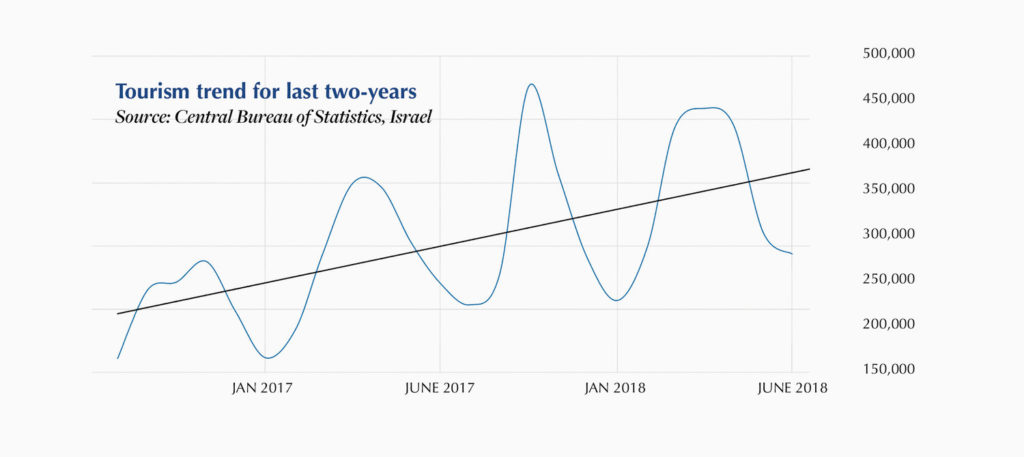- Frictionless investments in Israel
- +52 1 56 1018 6660
At its inception in 1948, Israel was an agrarian society.
Today, Israel is a sophisticated, cosmopolitan nation.
WHY ISRAEL?
Some of the most sought-after real estate in the world is in Israel. With a Human Development Index score of .89, Israel is 18th in the world, according to the United Nations and is “Very Highly Developed.”1 The International Monetary Fund ranks Israel 25th in Gross Domestic Product (GDP) per capita out of 192 countries.2 Trailblazers like Waze, Wix, and Mobileye (recently purchased by Intel for USD $15.3B) have eagerly joined the country’s international high-tech epicenter. They are helping Israel have the largest concentration of startups outside Silicon Valley and the third-largest number of startups in the world. Israel’s thriving Agritech sector has produced innovations including in-soil and in-tree sensors, robotic drones, plant genetics, smart irrigation, and big data analytics software.
FACT: 2018 represented the 11th consecutive year of economic growth for Israel.3
Multinational Influence
In addition to its long list of startups, Israel boasts the world’s third-highest number of NASDAQ-listed companies—lagging behind only the United States and China. More than 270 multinational corporations (MNCs) have established 320+ advanced Research & Development (R&D) facilities here, making Israel the “R&D lab” for the world’s leading hi-tech firms.
Names such as Google, Apple, Facebook, Microsoft, Intel, Yahoo!, Motorola, HP, Siemens, GE, GM, IBM, and Cisco dominate the corporate skyline. Multinationals employ about half of Israel’s hi-tech workforce, contributing significantly to the country’s economy.
FACT: Israel spends more than any other country on R&D as a percentage of GDP, 4.3%.4
Government Incentives
Along with a highly educated workforce, Israel’s comprehensive government initiatives make it one of the world’s most attractive places to do business. Foreign investors are lured by enticing incentives that include tax breaks and supportive grants designed to offset the cost of R&D. These benefits are spread across multiple sectors, including industry, tourism, and real estate, with a particular emphasis on hi-tech.
September 2010, Israel joined the Organization for Economic Co-operation and Development (OECD). The country has signed free trade agreements with the European Union, the United States, the European Free Trade Association, Turkey, Mexico, Canada, Ukraine, Jordan, and Egypt. On December 18, 2007, Israel became the first non-Latin-American country to sign a free trade agreement with the Southern Common Market (Mercosur trade bloc).
FACT: The Shekel, Israel’s currency, is a fully convertible international currency that is exchanged by consumers all over the world like the dollar and euro. Over the last eight years, the euro lost 36% of its value against the shekel.5
Education
A highly motivated and educated workforce draws these highly sought-after employers. For example, Israel produces the world’s highest concentration of engineers and Ph.D.’s per capita and has the second-highest percentage (47%) of 25 to 64-year-olds with advanced degrees among OECD countries.6 These, along with a quality university education system, have become primary drivers for the country’s top technology boom and rapid economic development.
FACT: Since 1966, Israel has the second most Noble prizes per capita. With just 0.2% of the world’s population, Israel has received 22% of the Noble Awards.7
Historical Tourism
A significant number of international tourists further boosts Israel’s economy. Visitors to here enjoy an abundance of historical and religious sites, beach resorts, archaeological tourism, heritage tourism, and ecotourism.
In 2017, 3.6 million foreign tourists visited Israel, an average 300,000 a month, that is a 25% increase over 2016’s total.8

FACT: Israel has the largest desalination plants in the world and has gone from a water shortage to a water surplus.9
Unlock the door to an extraordinary investment adventure.
Preserve your past, build your present, and invest in your future with ISRACAP.
B.H. ISRACAP LTD | Todos los derechos reservados
